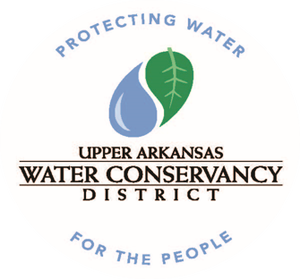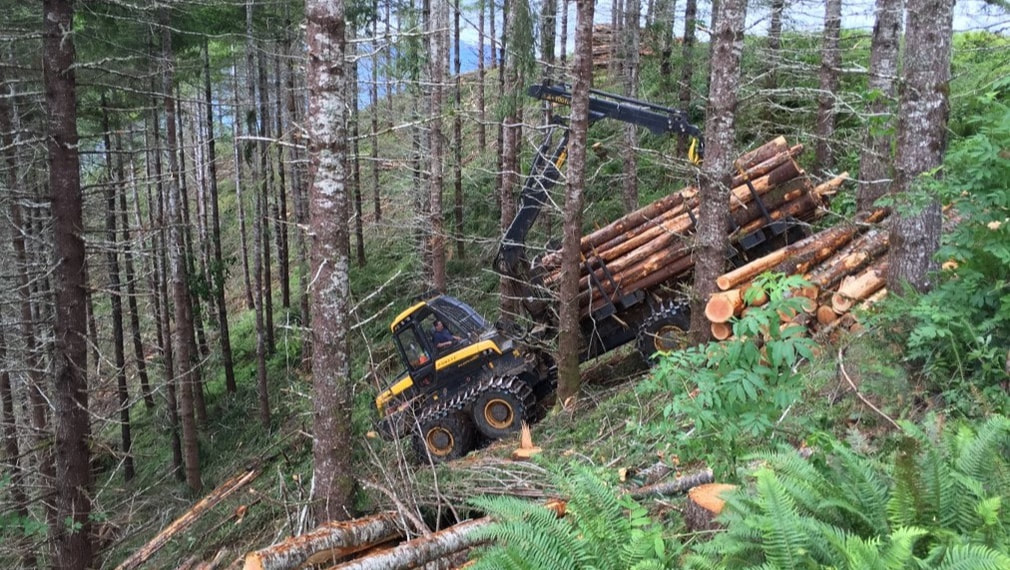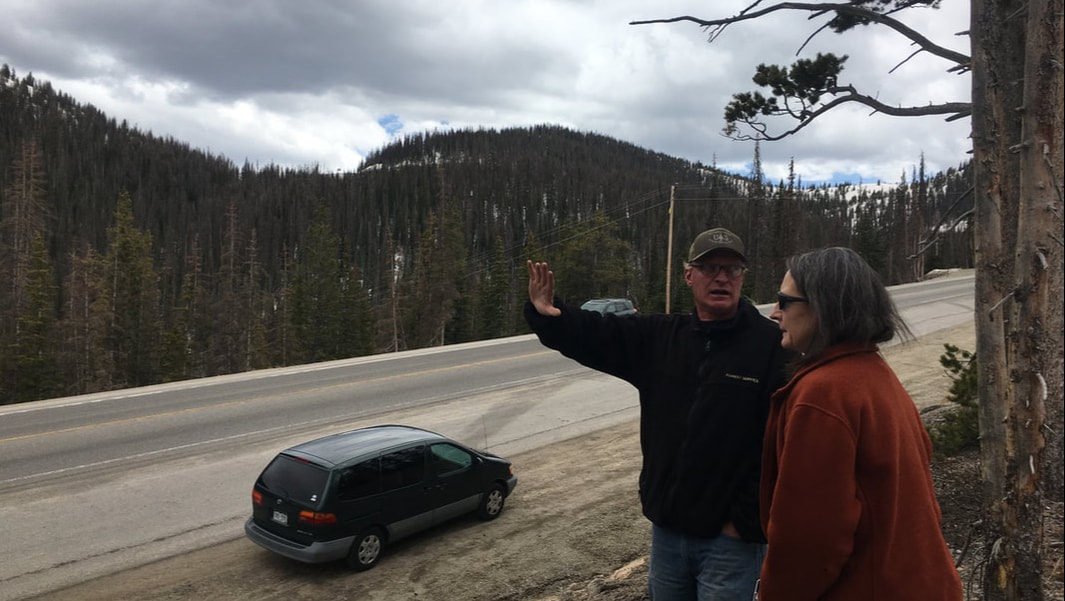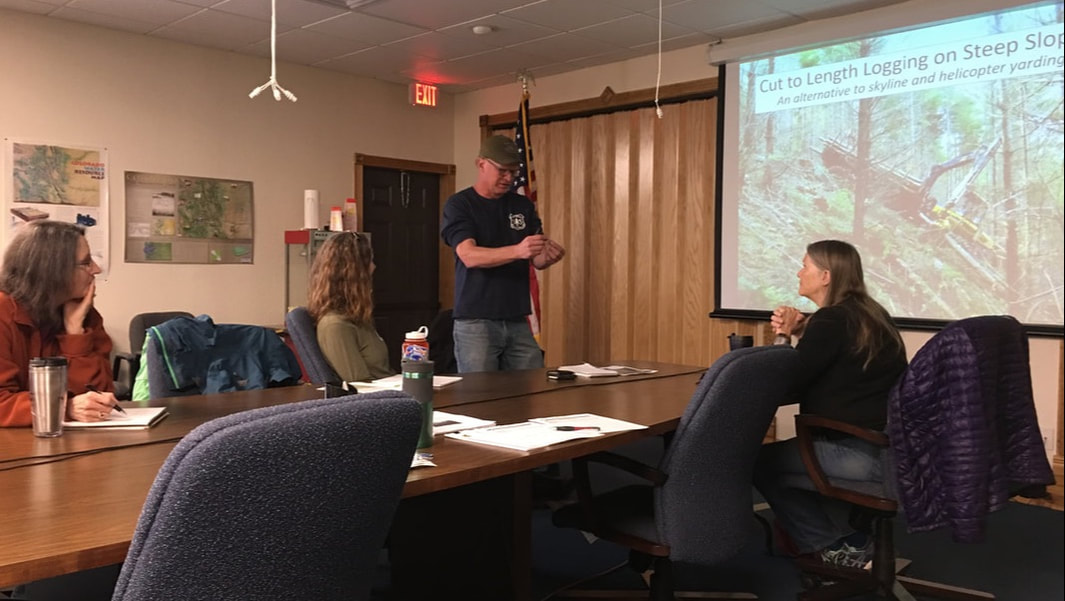Water Talks: Protecting Our Water Resources -Monarch Pass Forest and Watershed Health Project8/6/2018 No doubt fire is on everyone's minds this summer. It is clear that being proactive with the health of our local forests is imminent. Not only does it protect people, wildlife, the surrounding communities and infrastructure, but it also protects important water resources. The flash flooding and resultant runoff full of sediment, rocks, and debris that occurs with every big rain event following a wildfire, impacts the tributary streams, creeks and ultimately the Arkansas River. Forest fires also threaten storage vessels which provide critical water supply to all water uses; agricultural, municipal, environmental and recreational. Here at the Upper Arkansas Water Conservancy District we're working on an innovative forest and watershed health project on Monarch Pass to address wildfire before it happens. A proactive approach to watershed health The spruce beetle activity across the Monarch Pass area has increased to endemic levels, deteriorating the forest at an alarming rate. The US Forest Service (USFS) is moving forward with a fuels mitigation project that will treat approximately 3,000-acres of beetle-kill on Monarch Pass by harvesting the dead trees. The UAWCD has joined these efforts to help secure funding and partners for approximately 600-acres that is on steep slope terrain. Generally, steep slopes are excluded from forest mitigation projects due to safety concerns and the high costs associated with using traditional methods to remove down and dead trees. Yet, treating steep slopes is imperative. Often our most critical water supplies such as reservoirs and important drainages that feed into the Arkansas River are surrounded by steep slopes. Initial research has identified over 20,000 acres of this type terrain in the mountainous areas of the Arkansas drainage. Fortunately, the USFS has identified a new technology that can treat the steep slopes on Monarch Pass while at the same time saving money, reducing the impact to the environment and improving safety. This cutting-edge technology has never been used in Colorado, and when successful, this project will very likely become a statewide model for treating steep slopes across Colorado and hopefully encourage investment from private industry. The UAWCD is taking the lead and a very active role with outreach for the project to bring more partners and money to the table to protect our local water supply, as well as to introduce this new technology to others in the state. We recognize the urgency of protecting our forest and water resources and non-federal matching dollars help expedite the process significantly. We’re excited that to date, the UAWCD in partnership with Chaffee County, City of Salida, Town of Poncha Springs, Colorado Springs Utilities, and the Arkansas River Watershed Collaborative, have secured the needed matching funds to apply for a Colorado Water Conservation Board grant that could provide over a half million dollars for the project. The UAWCD is continuing to look for additional funding partners throughout the State and water community to move this project toward implementation and before a catastrophic forest fire. We encourage the water community, local municipalities, and other entities to support this project and to make it a priority. Although matching dollars are the best resource to move this project forward, Letters of Support are also vital and demonstrate that our community is committed to a hands-on approach to addressing forest and watershed health concerns. A special thank you to Central Colorado Conservancy for being the first local non-profit to provide a Letter of Support and volunteer hours for this project. It is not a matter of ifour local forests and water supply will be impacted by wildfire, but rather a matter of when. Let’s be proactive, today. Naturally what is emerging out of this project is a grassroots local watershed entity - a group of local and statewide partners working together on an important forest and watershed project. We hope to continue to build upon the momentum and strength of this effort for future projects. For more information, please contact Chelsey Nutter at UAWCD. About Water Talks
Water Talks is a monthly column published in area newspapers by the Upper Arkansas Water Conservancy District.
0 Comments
|
ABOUTLocal water news by the Upper Arkansas Water Conservancy District Archives
August 2023
Categories |
CONNECT |
|
UAWCD Technology Accessibility Statement
UAWCD is committed to providing equitable access to our services to all Coloradans.
Our ongoing accessibility effort works towards being in line with the Web Content Accessibility Guidelines (WCAG) version 2.1, level AA criteria. These guidelines not only help make technology accessible to users with sensory, cognitive and mobility disabilities, but ultimately to all users, regardless of ability.
Our efforts are just part of a meaningful change in making all State of Colorado and local government services inclusive and accessible. We welcome comments on how to improve our technology’s accessibility for users with disabilities and for requests for accommodations to any UAWCD services.
Requests for accommodations and feedback
We welcome your requests for accommodations and feedback about the accessibility of UAWCD’s online services. Please let us know if you encounter accessibility barriers. UAWCD is committed to responding as quickly as possible.
E-mail: [email protected]
Mail: P.O. Box 1090, Salida, CO 81201
Phone: 719-539-5425 (Written requests are preferred. If you are unable to submit your request in writing, you are welcome to contact us by telephone at this number.)
UAWCD is committed to providing equitable access to our services to all Coloradans.
Our ongoing accessibility effort works towards being in line with the Web Content Accessibility Guidelines (WCAG) version 2.1, level AA criteria. These guidelines not only help make technology accessible to users with sensory, cognitive and mobility disabilities, but ultimately to all users, regardless of ability.
Our efforts are just part of a meaningful change in making all State of Colorado and local government services inclusive and accessible. We welcome comments on how to improve our technology’s accessibility for users with disabilities and for requests for accommodations to any UAWCD services.
Requests for accommodations and feedback
We welcome your requests for accommodations and feedback about the accessibility of UAWCD’s online services. Please let us know if you encounter accessibility barriers. UAWCD is committed to responding as quickly as possible.
E-mail: [email protected]
Mail: P.O. Box 1090, Salida, CO 81201
Phone: 719-539-5425 (Written requests are preferred. If you are unable to submit your request in writing, you are welcome to contact us by telephone at this number.)




 RSS Feed
RSS Feed